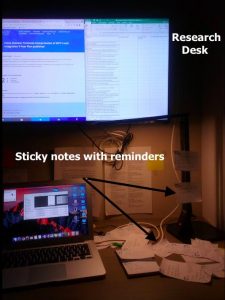This summer, I was an Undergraduate Research Scholar investigating the government procurement policies of emerging markets such as China, India, Brazil, and Indonesia. The ‘Industrial Policies in Protectionist Times: The Case of “Buy National” and “Hire National” Measures’ Project was done under the supervision of Dr. Maria Anna Corvaglia. All my expectations of this project were exceeded. I found myself learning new skills, challenging myself, and delving deeper into the subject area I am passionate about. My views on academic research has evolved as a result of this project.
My Role
My role in this project was to create an archive of local content requirement policies done under buy national regimes in emerging markets. I looked at policies that occurred after the 2008 financial crisis to the present. This entailed determining what type of local content requirements were employed, how it affected an industry, and the overall goal of the policy. For example, having local content requirements for the steel used to make trains is important when expanding your railway infrastructure. This archive was created using a mixture of official government documents, trade databases, and the World Trade Organisation Trade Review reports. I had weekly Skype meetings with Dr. Corvaglia where I shared what I had researched, and we would plan for the following week.
 I created a system of archiving for this project using excel. First, I would record the government policy. Then, I would fill in details about the policy such as the industry, the bigger picture, and related documents. Each document would be uploaded into a folder and would be given a unique reference code based on the row the policy was in, on the excel sheet. At the end, I would colour code each row based on sector, and size of infrastructure.
I created a system of archiving for this project using excel. First, I would record the government policy. Then, I would fill in details about the policy such as the industry, the bigger picture, and related documents. Each document would be uploaded into a folder and would be given a unique reference code based on the row the policy was in, on the excel sheet. At the end, I would colour code each row based on sector, and size of infrastructure.
In the first week, I created a bibliography of journal articles and books that discussed the policy space of these countries through an economic, political, and legal lens. I was invited to attend the Transatlantic Perspectives: The Future of European Law and Policy VI Conference. At this two-day conference, I had the opportunity to attend excellent lectures led by pioneers in the field such as Professor Thomas Cottier from the World Trade Institute. The following weeks were spent creating the archive, each week covering a different state.
The importance of this project is to determine how the government procurement policies worked alongside the goals of the World Trade Organisation. The World Trade Organisation’s main goal is to liberalise trade by reducing trade barriers. However, government procurement gets special treatment when it comes to these rules. There is a plurilateral agreement on government procurement at the World Trade Organisation. Currently China is negotiating accession to this treaty. Indonesia, Brazil, and India are merely observers to the agreement.
My Expectations
At orientation, I received an overview of what I would be researching, and how I should conduct this project. This did not mean that I was unable to go deeper into areas that interest me, in fact the opposite occurred. Dr. Corvaglia encouraged me to pursue my interests in the project. With her guidance I excelled in this role. For example, I am very interested in the One Belt One Road Initiative. I am certain it will change the landscape of international trade law and policies. During this project, I was provided with the resources to do further research in this area. One of the most interesting aspects of this project is how you saw the bigger picture come together week by week. Recognising the intersection of politics, law, and economics, rather than treating each discipline in isolation had a profound impact on the direction of the research. Once I started taking a multidisciplinary approach to the research, I gained a more holistic understanding of the bigger picture.

The opportunities presented during this project has opened my eyes to the different career opportunities in international trade law. It has equipped me with essential skills such as time management, critical thinking, and project planning. Having a research question is a starting point, not the end point. This is a valuable lesson to learn prior to my final year.
Nisha Telesford, LLB International Law and Globalisation
